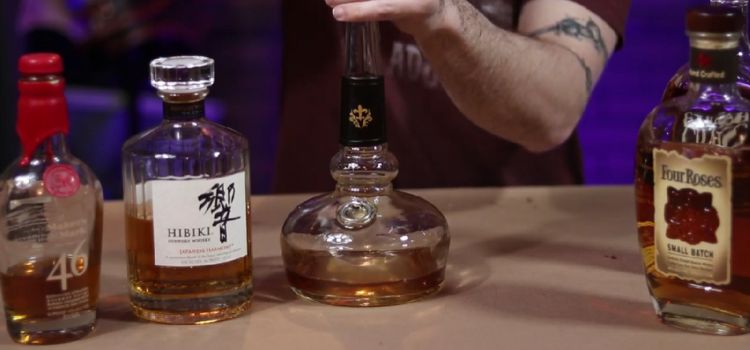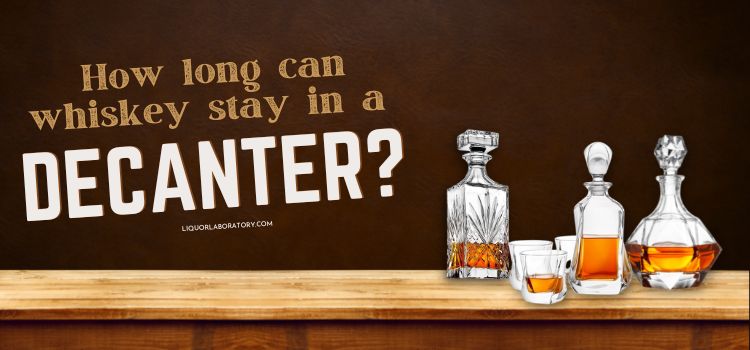Last Updated on March 13, 2024 by Lydia Martin
There’s always scotch whiskey, gold tequila, wine, dark rum, and other spirits in crystal decanters in one or a couple of movies we’ve seen. It’s aesthetically pleasing. A stylish decanter is also a perfect way to show the clarity of the spirits.
However, it makes one wonder if decanting whiskey makes the whiskey go bad. So how long can whiskey stay in a decanter?
Table of Contents
ToggleHow Long Can You Store Whiskey In A Decanter?

Whiskeys stored in the decanter can last between two months to three years, depending on how much alcohol there is in the lead-free decanter.
Other factors that can make the shelf life of whiskey longer in the decanter are temperature fluctuations, humidity, light, and if the decanter has an airtight seal.
Unopened bottles of whiskey can last for a hundred years if stored properly. While these spirits don’t spoil or become unsafe to drink, oxidation changes the flavor profile over time.
Decanter Storage Tips
Opened
You expose the spirits to air once whiskey bottles are opened and transferred to a decanter. Exposure to air is the largest factor in making the alcohol stale.
While oxygen won’t spoil a full decanter immediately, degradation will be faster than if you kept the liquor in the original bottle.
Unopened
Store liquor in an airtight decanter to make the whiskey maintain its integrity. Unopened whiskey in a decanter will last just as long as it would in the original glass alcohol container or bottle.
Ensure that your decanters have an airtight stopper, or else the alcohol will slowly evaporate and oxidize.
5 Factors That Affect Its Life Span

1. Decanter Type & Features
If the decanter has an airtight seal, the whiskey in a decanter can last for a minimum of two years. It’s also important not to put the whiskey into leaded crystal decanters because it can leach lead in the whisky over time.
It can cause lead poisoning, which occurs when lead build-up in the body, often over months or years. Small amounts of lead are detrimental to a person’s health [1].
2. Amount of Alcohol

The more air present in the decanter, the faster the whiskey in the decanter will oxidize. If the whiskey decanters have less than half alcohol, then the dissipation of the whiskey will increase.
It’s best to transfer the liquor in a small decanter so that the liquor will fill almost to the top.
3. How Long It’s Been Stored
Unlike a bottle of wine, whiskey doesn’t get better with time. It stops aging as soon as it’s transferred into a whiskey bottle.
Once you open a bottle of liquor and transfer it to the decanter, it’s exposed to environmental conditions that might affect its quality and taste.
Read: Should You Put Bourbon In A Decanter?
4. Number Of Times It‘s Opened

You expose the whiskey to air the more you open the decanter. Exposing it to oxygen will deteriorate the quality of the whiskey due to oxidation.
So, if you want to transfer your liquor into the decanter, you can keep whiskey in a decanter overnight but consume it the next day.
Meanwhile, annexing red wine into a carafe or crystal bottle allows the wine to open up. The wine reacts with air and allows the wine to change and improve its taste.
If you’re asking, does whiskey work that way, it doesn’t. But what’s good to mix with whiskey?
5. Position & Environmental Conditions
Keep the decanter away from light and in a room with a cool temperature to maintain the integrity of the whiskey.
Don’t leave whiskey decanter in places with frequent temperature changes, like on the top of a refrigerator. Also, don’t leave whiskey in areas with high humidity.
Read: Whiskey Proof Explained
4 Factors That Might Spoil It In A Decanter

1. Direct Exposure To Sunlight
Keep the decanter where there is no direct sunlight to keep the whiskey’s character for longer. The ultraviolet light reacts with tannins in the whiskey, which results in unpleasant aromas and a change in the whiskey taste.
If exposed to direct sunlight daily, bourbon, for example, will develop a flavor like paint thinner, plastic, and rubber balloon. It’s best to keep whiskey in the dark place.
2. Exposure To Air

If there’s a lot of headspace in the decanter, more oxygen is introduced to the decanters, and it oxidizes the remaining whiskey.
The alcohol is lighter than the water, which causes the volatiles to evaporate faster. This results in aroma and flavor molecules loss.
3. Moisture
High humidity exposure causes alcohol to evaporate faster. When there’s moisture, it deteriorates the liquor’s quality and shelf life. It’s best to control the moisture in the room where your whiskey is stored.
Store whiskey in a room with humidity levels between 50% to 70%.
Read: What’s the Best Bourbon Decanter?
4. Fluctuating Temperature

While oxidation takes place slowly because of the high alcohol levels, it can rapidly increase the whiskey’s expiration faster when the temperature fluctuates.
The frequent change in the temperature changes the composition of the whiskey, affecting its flavor or alcohol content.
It’s best to place the decanter in a room with temperatures between 59°F and 68°F.
Frequently Asked Questions (FAQs)
How long can you keep leftover whiskey in a decanter?
You can keep leftover whiskey in a decanter for years as long as the whiskey decanter has an airtight decanter seal.
Is it safe to keep whiskey in a lead crystal decanter?
No, it’s not safe to keep whiskey in a lead crystal decanter. Lead oxide gives a glass special brilliance and durability. However, lead is toxic and harmful to your health.
When the whiskey is placed in a whiskey decanter for longer periods, the lead from the decanter will slowly dissolve into the whiskey, increasing the possibility of lead poisoning.
How long can you leave whisky in a decanter?
Whisky can be left in a decanter for an extended period, but it’s essential to consider a few factors. The sealing quality of the decanter, exposure to light, and the room’s temperature can influence the whisky’s quality over time.
Generally, if stored in a cool, dark place with a well-sealed decanter, whisky can be left for several weeks to months without significant deterioration.
However, if you plan to store it for an extended period, it might be advisable to choose a decanter with a tight-fitting stopper or cork to minimize air exposure.
Is it OK to store whiskey in a crystal decanter?
Storing whiskey in a crystal decanter can be acceptable, but there are a few considerations. Crystal decanters are aesthetically pleasing and can enhance the presentation of the whiskey.
However, lead crystal decanters, which are more traditional, can potentially leach small amounts of lead into the spirit over time. If you choose to use a crystal decanter, ensure it is lead-free, or use it for short-term storage.
For long-term storage, especially of high-quality or aged whiskies, consider using lead-free glass or other materials designed for spirits storage.
Should you keep whiskey in a bottle or decanter?
Whether to keep whiskey in the original bottle or transfer it to a decanter depends on personal preference and how the whiskey will be consumed. The original bottle is designed to protect the whiskey from light and air, preserving its quality.
However, decanters are often used for aesthetic reasons, presentation, and the ritual of serving. If you plan to consume the whiskey relatively quickly, a decanter can be a stylish and functional choice.
For long-term storage, especially for collectible or high-end whiskies, the original bottle may offer better protection.
What is the point of a whiskey decanter?
The primary purposes of a whiskey decanter are aesthetic and functional. Aesthetically, decanters are designed to enhance the presentation of whiskey, particularly in formal or ceremonial settings.
Functionally, decanters can aid in aerating the spirit, allowing it to breathe and potentially evolve in flavor over time. However, the impact of aeration is generally subtle, and decanting is more about the experience and visual appeal.
Is it OK to leave whiskey in a decanter?
It’s generally acceptable to leave whiskey in a decanter for a limited period, such as a few weeks to a few months. However, factors like the quality of the seal, exposure to light, and room temperature can influence the whiskey’s stability.
If you plan to store whiskey for an extended period, it’s advisable to choose a well-sealed decanter, keep it in a cool, dark place, and monitor its condition to prevent deterioration in flavor and quality.
Is it bad to leave alcohol in a decanter?
Leaving alcohol in a decanter for an extended period can have both positive and negative effects. On the positive side, a decanter can enhance the presentation of the alcohol and, in some cases, allow it to breathe, potentially altering and improving its flavors.
However, on the negative side, prolonged exposure to air and light can lead to oxidation and evaporation, affecting the alcohol’s taste and aroma. If the decanter is not airtight, alcohol can evaporate over time, and the remaining liquid may lose some of its original characteristics.
How do I know if my decanter is airtight?
To determine if a decanter is airtight, perform a simple test. Fill the decanter with water, cover it, and turn it upside down for a few minutes. If water doesn’t leak, the decanter is likely airtight.
However, keep in mind that airtightness doesn’t guarantee complete protection against evaporation, as some subtle leaks may still occur over an extended period.
How long can whiskey last unopened?
Unopened whiskey can last indefinitely if stored properly. The key factors for preserving the quality of unopened whiskey are keeping it in an upright position, away from direct sunlight, and in a cool, stable environment.
Whiskey does not spoil or expire like perishable goods, but it can change over time due to factors such as oxidation and changes in temperature.
Why drink whiskey out of crystal?
Drinking whiskey out of crystal is often considered an indulgence in both visual and sensory aspects. Crystal glassware, with its clear and delicate appearance, allows drinkers to appreciate the rich color and visual appeal of the whiskey.
Additionally, crystal glasses are thinner and more refined than standard glass, providing a smoother and more enjoyable drinking experience. The choice of crystal is often associated with special occasions, adding an element of elegance and sophistication to the whiskey-drinking ritual.
Can whisky evaporate in a decanter?
Yes, whisky can evaporate in a decanter, especially if the decanter is not airtight. Evaporation occurs when alcohol molecules escape into the air over time. If a decanter has small leaks or is not sealed properly, it can lead to the gradual loss of alcohol content.
To minimize evaporation, it’s recommended to use a high-quality, airtight decanter and store it in a cool, dark place. Regularly checking the seal and the whisky’s level in the decanter can help prevent excessive evaporation and maintain the integrity of the spirit.
Final Verdict: How Long Can Whiskey Stay In A Decanter?
Whiskeys can last for years provided that it is properly stored and the decanter seal is effective. However, you can’t assure that it will have the same quality as a newly opened bottle of whiskey.
If you’re wondering how long can you keep the whiskey in a decanter, it depends on the whiskey storage.
If you’re asking, “does whiskey age in a bottle like wine,” the answer is “No.” Decanting has an actual function in wine.
In whiskey, the primary reason to decant whiskey is mostly for aesthetic purposes. Glass decanters add a nice look to your liquor cabinet or bar.
Storing whiskey in decanters can also be used to hide whiskey labels. If there’s whiskey tasting, it allows people to enjoy the drink without knowing its value beforehand.
Reference:
















